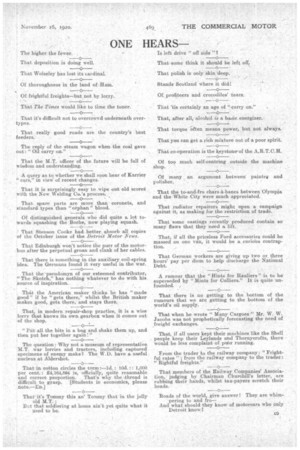ONE HEARS
Page 3

If you've noticed an error in this article please click here to report it so we can fix it.
The higher the fewer.
That deposition is doing well.
That Wolseley has lost its ea; dinal.
Of thoroughness in the land of Ham.
Of frightful freights—but not by lorry.
That The Times would like to time the tuner.
That it's difficult not to overcrowd underneath overtypes.
That really good roads are the country's best feeders.
The reply of the steam wagon when the coal gave out: "Oil carry on."
That the M.T. officer of the future will be full of wisdom and understanding.
A query as to whether we shall soon hear of Karrier " cars," in view of recent changes.
That it is surprisingly easy to wipe out old scoreg with the New Welding Co.'s process. • That spare parts are more than coronets, and standard types than "orphan" blood.
Of distinguished generals who did quite a lot to 'wards squashing the Boche, now playing squash.
That Stenson Cooke had better absorb all copies of the October issue of the Detroit Motor News. That Edinburgh won't notice the purr of the motor bus after the perpetual groan and clank of her cables.
That. there is something in the auxiliary coil-spring idea. The Germans found it very useful in the war.
That the pseudomyn of our esteemed contributor, "The Sketch," has nothing whatever to do with his source of inspiration.
That the American maker thinks be has "made good" if he "gets there," whilst the British maker makes good, gets there, and stays there.
That, in modern repair-shop practice, it is a wise lorry that knows its own gearbox when it comes out of the shop.
" Put all the bits in a bag and shake them up, and then put her together again !" • 0 The question: Why not a museum of representative. M.T. war lorries and tractors, including captured specimens of enemy make? The W.D. have a. useful nucleus at Aldershot.
That in cotton circles the term :-1d. : 10d. : : 1,000 per cent. : 24,164,894 is, officially, quite reasonable and correct proportion. That's why the \thread is difficult to grasp. [Students in economics, please note.—En.] That it's Tommy this an' Tommy that in the jolly old M.T. ; But that soldiering at home ain't yet quite what it used to be. Is left drive " off side "I That-some think it should be left off. That polish is only skin deep.
Stands Scotland where it did!
Of profiteers and crocodiles' tears, That 'tis certainly an age of "carry on." That, after all, alcohol is a basic energizer.
That torque often means power, but not always.
That you can get a rich mixture out of a poor spirit.
That co-operation is the keystone" of the A.R.T.C.H.
Of too much self-centring outside the machine shop.
Of many an argument between" painter and polisher.
That the to-and-fro chars-a-bancs between Olympia, and the White City were much appreciated.
That radiator repairers might open a campaign against it, as making for the restriction of trade.
That some castings recently produced contain so inany flaws that they need a lift.
That, if all the priceless Ford accessories could be massed on one van, it would be a curions contraption.
That German workers are giving up two or, three hours' pay per diem to help discharge the National Debt.
A rumour that the "Hints for Hauliers" is to be superseded by Mints for Colliers." It is quite unfounded.
That there is no getting to the bottom of the rumours that we are getting to the bottom cf the world's oil supply.
That when he wrote "Many Cargoes" Mr. W. W. Jacobs was not prophetically forecasting the need of freight exchanges.
That, if all users kept their machines like the Shell people keep their Leylands and Thornycrofts, there would be less complaint of poor running.
From the trader to the railway company: " Frightful rates" from the railway company to the trader " Rightful freights."
That members of the Railway Companies' Association, judging by Chairman Churchill's letter, are rubbing their hands, whilst tax-payers scratch their heads.
Roads of the world, give answer! They are whimpering to and fro— And what should they know of motorcars who only Detroit know ?






























